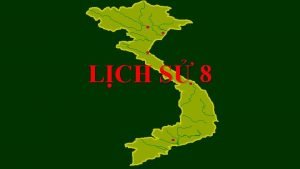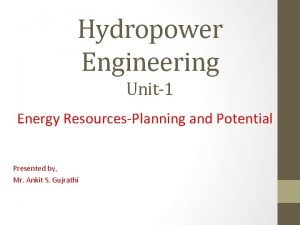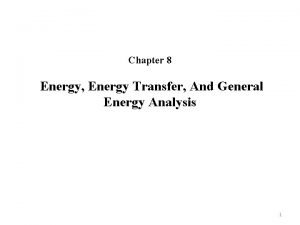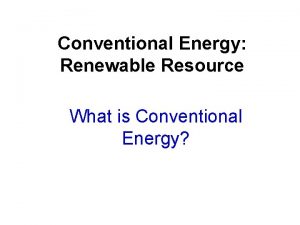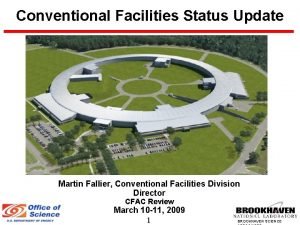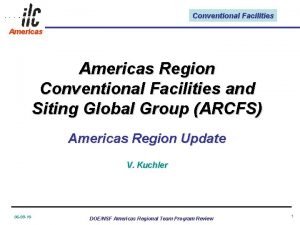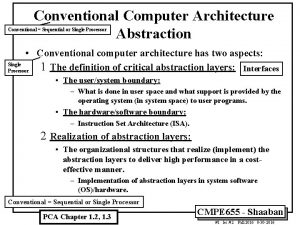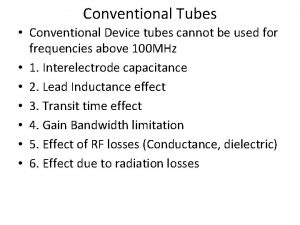Conventional Energy What is Conventional Energy Energy that











- Slides: 11

Conventional Energy

What is Conventional Energy • Energy that is derived or taken from “classic” ordinary sources • 98% of Canada’s Energy comes from • Oil (39%) • Natural Gas (35%) • Electricity (24%) • Canada is one of the top users of Energy in the world, why?

Why do we waste Energy • We live in a very cold northern climate for long periods of time • Canada is so large that we use a lot of energy during transportation • Transportation of energy itself too • Canada is a developed nation with an advanced economy • Energy is so cheap… why not waste it?

Electricity • Electricity is produced by a generator powered by a spinning turbine • This converts mechanical energy into electrical energy (you’ll learn more about this in physics) • 3 Main types of electricity generating stations in Canada: • Hydro-electric • Thermal-electric • Nuclear-electric

Hydro-electric Generator • Also called dams because a giant barrier is built in a river that has a significant change in elevation • The dam blocks water on one side, creating a reservoir (damming the water) • The reservoir water flows through a pipe, down to a spinning turbine • The river must have a reliable flow of water as well • The force of the water flowing from a higher elevation to a lower elevation drives the generator

Thermal-electric Generator

Thermal-electric Generator • Rather than moving water, steam is used to spin the turbines and in turn cause the generator to turn • The steam is produced by burning coal, oil, natural gas, wood or even garbage • Coal is the filthiest fuel on the planet meaning when burned it creates toxic smoke with poisons and greenhouse gases • Oil and Gas are not much better

Nuclear-electric Generator

Nuclear-electric Generator • Like thermal, it uses steam to drive the turbine and generator • The heat used to boil the water is caused by the radioactive breakdown called fission of uranium atoms • Uranium is mined all over the world and was once never thought to hold any value • Cheapest, most efficient and most competitive source of energy to oil, and gas……. Unless………. • Three Mile Island, Chernobyl, Fukushima EXPLOSIONS

Crude Oil and Natural Gas • Formed by compression of marine animals that have sunk to ocean floor (millions of years) • Found naturally usually together in geological structures beneath the surface of the earth • Found and taken from earth by drilling and wells

Canada’s Oil and Gas • Found in western Canada, mostly AB and adjoining provinces, stretching as far as western MB • Includes “conventional” crude oil as well as synthetic crude oil • Synthetic crude oil comes from oil sands which is mined not drilled • Oil like substance called Bitumen is found around sand particles • Sand is dug, and bitumen is separated and processed to create synthetic crude oil • Very abundant in Northern Alberta
 Phân độ lown
Phân độ lown Block nhĩ thất độ 2 mobitz 1
Block nhĩ thất độ 2 mobitz 1 Thơ thất ngôn tứ tuyệt đường luật
Thơ thất ngôn tứ tuyệt đường luật Thơ thất ngôn tứ tuyệt đường luật
Thơ thất ngôn tứ tuyệt đường luật Chiến lược kinh doanh quốc tế của walmart
Chiến lược kinh doanh quốc tế của walmart Tìm vết của đường thẳng
Tìm vết của đường thẳng Hãy nói thật ít để làm được nhiều
Hãy nói thật ít để làm được nhiều Tôn thất thuyết là ai
Tôn thất thuyết là ai Gây tê cơ vuông thắt lưng
Gây tê cơ vuông thắt lưng Sau thất bại ở hồ điển triệt
Sau thất bại ở hồ điển triệt Hypdro
Hypdro Energy energy transfer and general energy analysis
Energy energy transfer and general energy analysis







